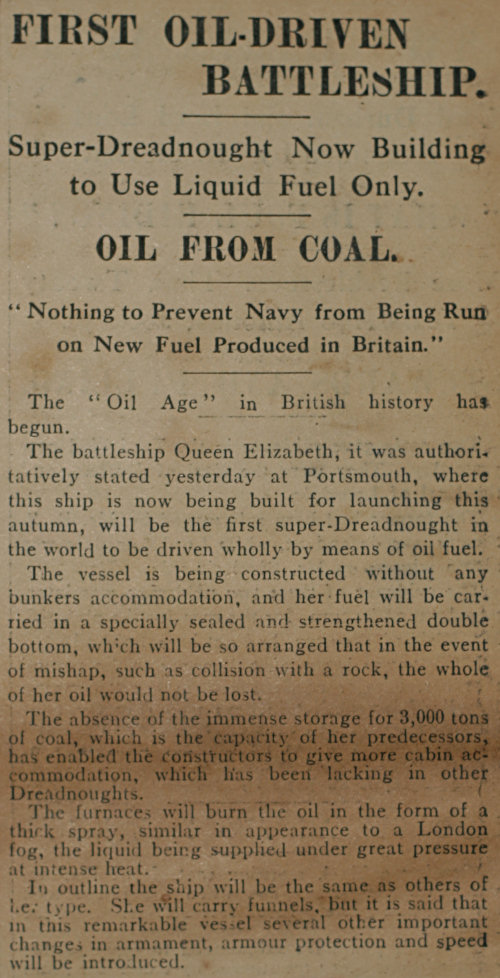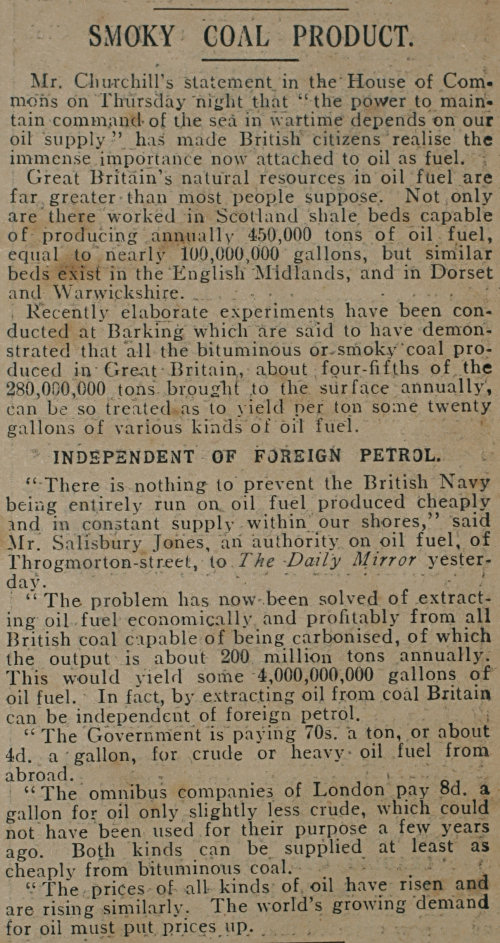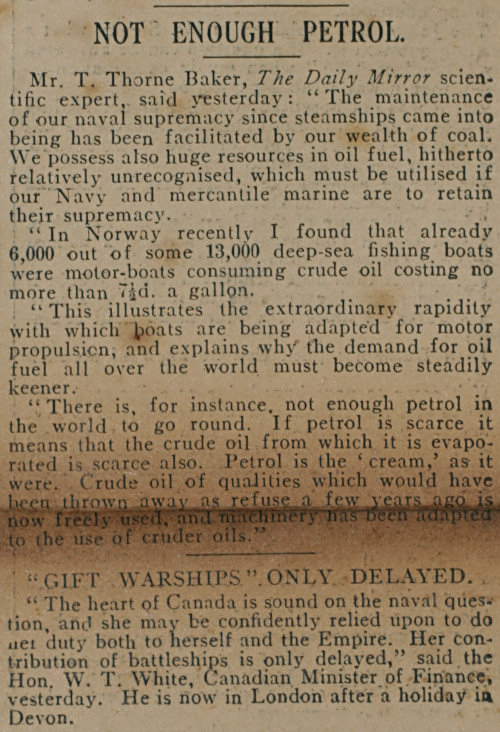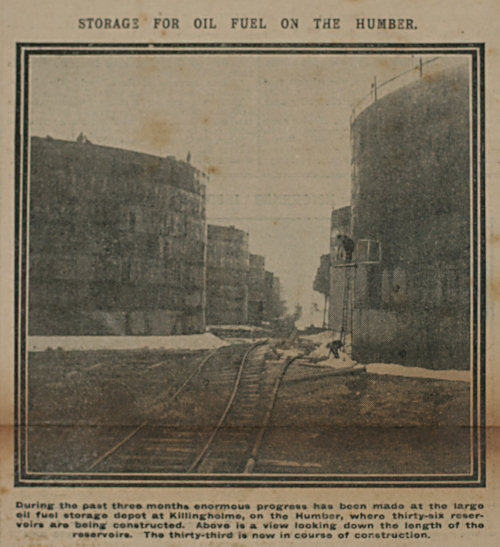Beginnings of UK “Oil Age”
Posted by Chris Vernon on January 2, 2007 - 9:08pm in The Oil Drum: Europe

During my travels this holiday season I came across a single page from the Daily Mirror, a British tabloid (if that’s the historically correct term), from 19th July 1913. This would have been interesting in itself but this 93 year old sheet of paper had a very interesting story about the construction of Great Britain’s first oil-driven battleship heralding the beginning of the “Oil Age”.
Churchill underlines the military importance of imported oil leading the discussion to the country's potential self sufficiency in oil. Clearly this is decades before off-shore oil discoveries so shale beds are considered along with a recent breakthrough demonstrating how some 20 gallons of oil can be economically produced from a ton of coal.
Of course some things never change, growing world demand was even reported to be forcing up the price of oil in 1913. As it turned out the UK never embarked on economically significant coal to liquids programmes or exploitation of the shale resources.
Full article below the fold.

Further information on HMS Queen Elizabeth is available here: Wikipedia


The image below shows the construction of an oil storage depot at Killingholme. Interestingly this is now the site of a large ConocoPhillips oil refinery, opened in 1969 and sited here as a good place to land North African crude. The simultaneous discovery of North Sea oil made it a highly successful venture now responsible for 10% of UK petrol and 14% of all other oil products.





Hello Chris,
Fascinating old article! I wonder if those opposed back then deliberately pointed out the circular irony of the direct linkage of blood-for-oil with this oil-powered battleship fighting for oil imports to keep the British Royal Navy fighting for ever more imports...ad infinitum. Evidently, two World Wars were not enough to get our global leaders to consider an alternative path. Will the true reality of Peakoil change this detritovore dynamic?
Bob Shaw in Phx,Az Are Humans Smarter than Yeast?
There's a good account of this era, and a lot more details re: the decisions (and decision-makers behind them), in the opening chapters of Robert K. Massie's "Dreadnought". It's been a few years since I read it, but as I recall, even though the decision was ultimately Churchill's, a lot of the impetus for the switch from (domestic) coal to (foeign) oil came from the visionary Admiral Fisher.
Chris - worth noting that the opening sentence of 'The Prize" (written by Pulitzer Prize wining author Daniel Yergin) is "Winston Churchill changed his mind almost overnight" - referring to the decision to convert the British fleet from coal to oil - the rest is history.
I'm just about done The Prize. Fascinating read, all 800+ pages. But it makes me wonder how a guy, who obviously understands that oil fields eventually decline, can be so optimistic about world oil supplies.
Sometimes it's as easy as watching the trends. EIA, IEA & Colin Campbell have been the most prolific suppliers of annual outlooks wrt Peak Oil. EIA, IEA & the optimists have been revising their targets downward over the years by an avg of 3-mbd/annum.
The Peaksters have been upward revising by just under 2-mbd/annum.
It is relatively easy to revise up due to availability of bottom-up flow analysis on the short and medium term.
The long term targets have been based, disturbingly, on demand projections tied to Real GDP Growth. These 2020 to 2030 targets are also dependent on sufficient resource (URR). Using Hubbert type analysis, URR's in the 3 or 4 Trillion barrel magnitude helped justify those targets from an geologic viewpoint. What is lacking unfortunately is sound basis for supply from each country associated with the targets and timelines.
The first to lash out was Saudi Arabia at the CSIS Conference in 2004. It called the IEA & EIA targets for itself absurd. But they have been a voice in the wilderness in their pleas for sanity and due diligence on the part of stakeholders and decision makers. It did make some difference. TrendLines chastised EIA and published an "Aramco-modified EIA projection to draw light and scrutiny. The 2005 EIA model was trimmed 10mbd accordingly.
If awareness of the Peak Oil phenom and consequences are to become topical, it is necessary to challenge the 2020 to 2030 targets that give sighs of relief to peak watchers.
At this point, it is only the the upward revisions (as shown below) that have momentum and gain the attention of analysts and pundits. At TrendLines, we are entering the third year of posting our tracking updates of the ASPO/Campbell record. Colin's Peak Rate has moved between 64-mbd to 89-mbd. The Peak Date has ranged from 1995 to 2012. Exhaustion has been extended from 2060 to 2100.
Optimism is relatively easy when the magnitude of upward revisions is incrementally increasing ... not decreasing:
Thanks very much for these graphs!
What they show is that Cambell's predictions for the maximum rate of Oil production is greater than what is needed to stablize the global climate temperature to a rise of 2 degrees or less.
This is generally regarded as requiring a 60% decrease in in CO2 output from 1990's levels, which would be 24 MPD by 2050.
In other words, we have to do better than Peak Oil would allow us. So it's not a matter of "if" Peak Oil will occur, it is matter of how can we do better than Peak Oil.
Ah but oil is a pretty small amount of total anthropogenic CO2 emissions. See this graph from the James Hansen article:
That shows the cumulative atmospheric concentration of CO2 from each fuel with a peak oil/gas very roughly around 2030. There just isn't enough oil/gas to get to past 400ppmv. Climate change is all about the coal and non-conventional oils in my mind. In fact I'm not convinced non-conventional oils are ever going to economically scale up so maybe it's really just about the coal.
Thanks very much! This is most informative.
This also seems to illustrate "Peak Coal" at 2050.
I am not sure what constitutes 'scale' on non conventional oil, in your mind, but I am fairly certain Canada will reach 5m b/d of Tar Sands oil, and Venezuela has equivalent capacity of its heavy oil *however* greater infrastructural challenges and political issues.
Whether Canada could get to 10 m b/d I don't know.
I would think, if oil was say, $120/bl, that 5-10m b/d of Coal-to-Oil and NGL would be quite likely.
In both cases, the GW consequences are pretty frightening. I believe the burning of a barrel of tar sands oil has, end-to-end, 3 times the CO2 emissions of a barrel of conventional oil.
Agree with your tack that coal is the primary GW issue (along with deforestation, non CO2 greenhouse gases, etc.).
For some reason, possibly the sepia and the post-victorian language, I am reminded of Robert Newman's History of Oil. Perhaps it's the reference to Oil being a primary reason for the frictions that started WWI.
Have you Oil Drummers seen it? Click the link above for the video - interesting, poignant and very funny - he covers the basic concepts and repercussions of peak oil in a accessible way. Absolutely worth watching.
Happy new year chaps.
Thank you for posting the link to "Newman's History of oil."
It's hilarious and informative and will hold people's attention spans longer than "end of suburbia" etc.
First post. Robert Newman's video was what brought peak oil to my attention last summer. I'd not heard the term before and following the links has been an eye-opener. The Oil Drum is now required daily reading for me, thanks to all involved for your hard work.
BTW has anyone spotted the Shell commercial currently running on Bloomberg TV? It cites the era of easily recoverable oil being over, and their development of a new 'snake' drill or pipe they use to reach hard to access pockets.
Robert Newman video:
I have enjoyed it.
Does anyone have a credible source or citation for his claim that Britain's first action in WWI involved Dorset Regiment's Second Batt doing something in Iraq? History records British assault on the Fao fortress near Basra in November 1914, well after the fun started in Europe.
I'ts an important point, but he's the only source I have for this.
There are contact details for Robert Newman at
http://www.robnewman.com/contact.html